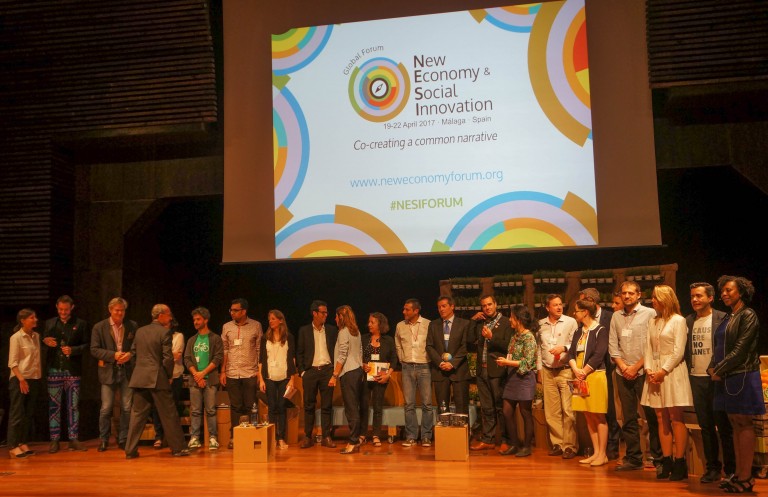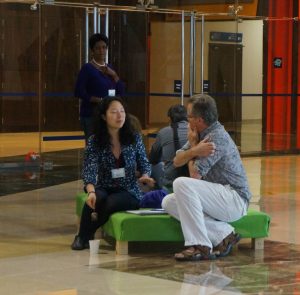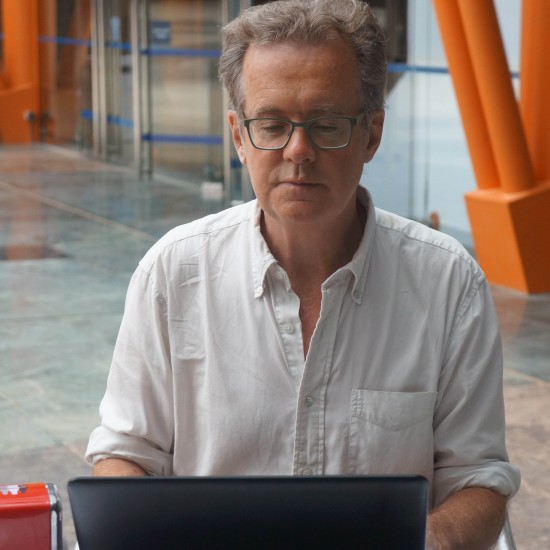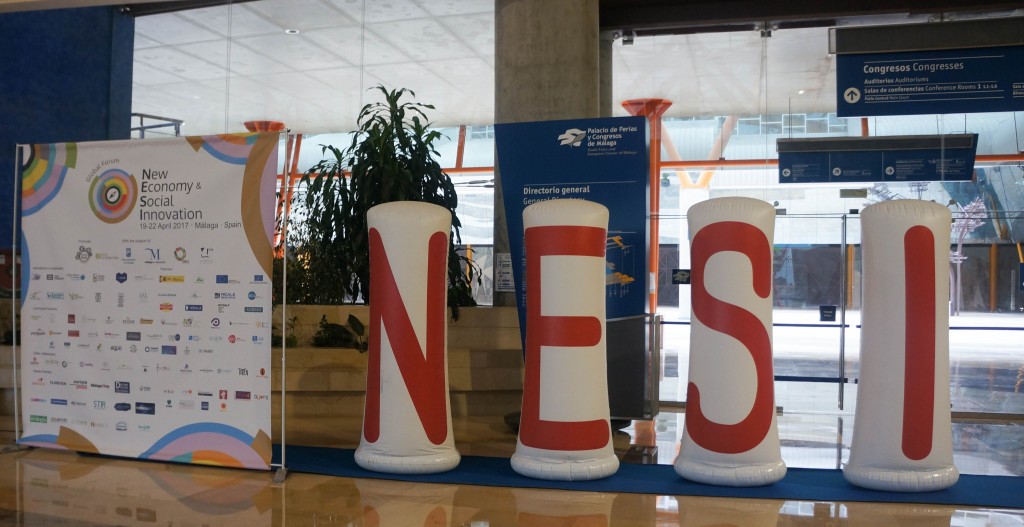NESI – Interview with Jonathan Dawson – Schumacher College
‘It is all a question of story’ – Thomas Berry
It was the possibility of a new narrative that captured my imagination when deciding to attend the New Economy Forum in Spain in April 2017. The journey to the conference took just over three hours from my home on a hill in southern Portugal. Leaving a warm Eastern Algarve, I ventured into Spain, a cooler, wetter, but informative space.

My intention in writing this article (and future articles), is to report and reflect on some of the learning encountered at the New Economy & Social Innovation Forum attended by 700 activists, thinkers, and doers from 43 countries. Attendess came together at the largest conference centre in Malaga, in the Palacio de Ferias y Congresos, from 19-22 April.
The ambitious blurb for the Forum outlines the detailed purpose:
‘The aim of this forum is to create a road map which provides the steps to guide governments towards a new paradigm based on values and which guarantees the wellbeing of all people.’
Over the four days I interviewed three people with distinct voices, who are pioneers of the new stories, co-creating different approaches to happiness and relationship within and between communities across the globe. Although coming from diverse backgrounds, there is a common thread of clarity, communication, the value of local relationships, connection, and spirituality, which weaves through their ideas and practice.
What I tried to do in workshops, the main sessions and the break times, was listen, share, take photos, record voices and meet men and women who are living and leading processes for collective and individual change.
Throughout the conference, co-operation was promoted as the key to the fruition of plans and strategies for participants to act in collaborative ways, both locally and globally. There was a particular focus on developing new economic models, to work across and between NGOs, business associations, public administrations and social movements.
Added to this, the academic world and civil society, attempted to work together to contribute fresh approaches to existing and new ideas using “bottom-up” processes. The intention was to enthuse and mobilise the eager attendees.
What enriched the forum, at least for me, was the ephasis on process work, which created reflective moments of clarity.
Simultaneous translation into English and Spanish along with indigenous wisdom added depth to the conversations.

In preparation for the interview with Jonathan Dawson, I re-read an article he wrote in 2015, published in the magazine Resurgence, called, ‘We need new stories and to start living them.’
Jonathan is Head of Economics and leads the Economics for Transition Master’s programme at Schumacher College in Devon. He has lived in ‘Intentional Communities,’ (including Findhorn) for over 20 years. He is the former President of the Global Village Network.

It has been a couple of years since he wrote the article in Resurgence, so I started by asking him whether he still feels we need new stories. In a lilting, soft, Irish voice, Jonathan generously shared stories about a different type of economics that includes the gift economy.
He said, ‘story, in this context refers to the grand societal narratives, those clusters of beliefs and cultural norms that give shape and meaning to the human cultures within which we live.’
So, I asked for some examples.
He said, ‘there are tons of things happening that are creating new narratives.’
He referenced South America and in particular São Paulo, Brazil, where, he said elders sharing local stories brings together culture and memory. Again, in Ecuador, he said, local communities are having more of a say in decision making, with traditional knowledge and indigenous wisdom being valued because it offers insights for conservation and sustainable action.
He said, ‘the raw transaction of monetary exchange breaks a number of taboos in traditional societies,’ where the relationship is paramount.
Continuing the same thought he said, ‘the current economy is based on transaction rather than relationship. Schumacher noted this over fifty years ago, that what gives us happiness is quality of work and quality of relationships. In our current system, we work in isolation often doing work we don’t particularly enjoy. So much of my study is now looking at anthropology and sociology, where gift giving and reciprocity is crucial to our well-being and is the glue that holds communities together. So the act of giving monetary exchange or cash, says, I do not need a relationship with you.’
He shared his own story of a neighbour who sent her daughter to his home to acquire three eggs; she came with money – a £1. Jonathan said, ‘I told her, here are the eggs and I do not want the money.’ Later the daughter came back with a large piece of cake. This transaction he said, ‘created the opportunity for relationship and playfulness.’
This made me think about how often people avoid neighbours and therefore avoid building friendships and new relationships, because of fear of the unknown.
I next asked about how the new story is different? He said, ‘The emerging new stories, by contrast, are built on a marriage of findings and developments in holistic science and human ecology, and draw generously on insights drawn from ancient wisdom traditions.’
So how do you teach this at Schumacher College?
‘Well, we have redefined Economics under three headings: Participation, Experiential, and Spiritual or (the good), with all three being deeply rooted in Community.’
He continued, ‘I am increasingly persuaded that the greater transformative potential resides less in what than in how we teach – that is, in the domain of pedagogy.’
‘In mainstream academia and beyond, underlying assumptions are coming under increasing scrutiny as a growing number of educationalists suggest that it is time for a revolution in our understanding of how learning takes place, informed by insights derived from systems thinking and complexity theory.’
This type of thinking borrows from the ideas of Fritjof Capra, who argues: ‘Systems thinking is “contextual,” which is the opposite of analytical thinking. Analysis means taking something apart in order to understand it; systems thinking means putting it into the context of a larger whole.’ –
The Systems View of Life: A Unifying Vision.
So how do the students react?
‘We are oversubscribed. More and more students are choosing to study this way. This kind of educational paradigm changes the traditional teacher-student relationship. Teachers play the roles of catalyst, mentor, provocateur, and, to some degree, also that of peer within the learning community of which they form a part.’
His comments, reminded me of the similarity to Community Group work, where a a facilitator does not teach but is part of a process of exchange and learning.
Jonathan argues that this approach provides a ‘dynamic understanding of how the world works by shifting the focus from things to relationships and patterns,’ and thus the ‘dominant metaphor is beginning to transition from machine to living system, from dead matter to animate Earth. As scholars of the new economy, we have to stand apart from just the intellect and develop the body, the heart, and the intuition. So students and staff engage with the world not as a puzzle to be solved but into a deep life’s work.’
So where can we find out more about this educational shift?
Jonathan smiled and said, ‘I have just written a chapter with Hugo Oliveira from the University of Lisbon for the World Watch Institute’s, State of the World Report 2017. The report is called ‘Rethinking education on a changing planet.’ Our chapter is, ‘Bringing the classroom back to life.’
Interview ends.
The next interview to be posted is with Felipe Viveros
European Representative, of The Bhutan Happiness project.
